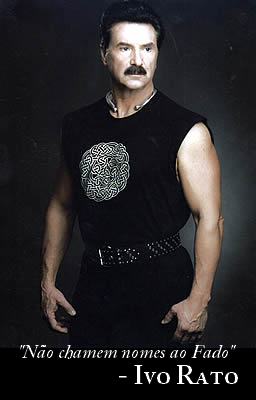WHAT IS FAENA?
Primarily the word faena is a Celtic/Gaelic derivative representing the ritual and rules of the Matador and the Bullfight being all about fertility.
As the Celts placed such importance on the number three, it is easy to see that relevance here. Long Ago in the past there was ‘birth – fado‘, now in the present time there is ‘life – fandango’ and the thought of our destiny into the future, except with the future there must come a time for ‘death – faena‘. The Old King simply must die to make way for the New King. The Celts had such an understanding of this that they were without fear of death. Prior to going into a magnificent battle with the potential outcome of death, lending a good friend money to be paid back in the afterlife, was even more acceptable as offering a loan to be paid back tomorrow. Many Roman writers and philosophers often discussed and wrote that the Celts response to the question of fear was simply:
"We fear no man; we fear nothing, except one day the sky may fall upon our headsâ€
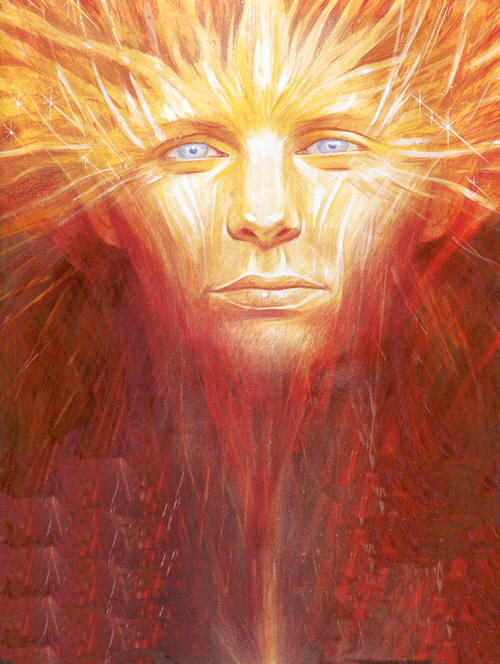 LUGH, the Sun God is seen by the Celts to be born every morning of every day, by midday the Sun God is middle aged and of course by nightfall the Sun God dies and disappears beyond the horizon. After almost five billions years of this re-occurring, you can be reasonably certain the Sun God will be born again in the morning.
LUGH, the Sun God is seen by the Celts to be born every morning of every day, by midday the Sun God is middle aged and of course by nightfall the Sun God dies and disappears beyond the horizon. After almost five billions years of this re-occurring, you can be reasonably certain the Sun God will be born again in the morning.
 And as the first rays of sunlight break the darkness for the dawn, all the cock roosters in the villages on the other side of the mountains all over France and Portugal… will echo (as they have done every day since ‘long ago’ this is the reason these two countries share the rooster logo) the good news to all Celts of the re-birth – which by their common belief is their destiny.
And as the first rays of sunlight break the darkness for the dawn, all the cock roosters in the villages on the other side of the mountains all over France and Portugal… will echo (as they have done every day since ‘long ago’ this is the reason these two countries share the rooster logo) the good news to all Celts of the re-birth – which by their common belief is their destiny.
Faena, so the story goes that thousands of years ago, possibly during the recent astrological time of Taurus, or perhaps the previous time of Taurus (i.e. one of our Sun Gods Twelve Astrological Disciples) a famous and powerful Druid had decided it was no longer fitting that this magnificent animal should be unashamedly dragged over to a tree and tied up to have its throat cut as a sacrifice to the Gods… instead he would have the warriors of the Tara Miliate (the ancient martial arts) compete to win the right for the ultimate death-match, to stand in the face of the bull and one or the other being the loser, offering themselves as a potential sacrifice to the Gods. The winner of this match was guaranteed immortality, either the man or the beast. From that time on, this competition would forever more be the highest honour of the:
‘FOUR SEASONS’ - MOST ANCIENT CELTIC GAMES.
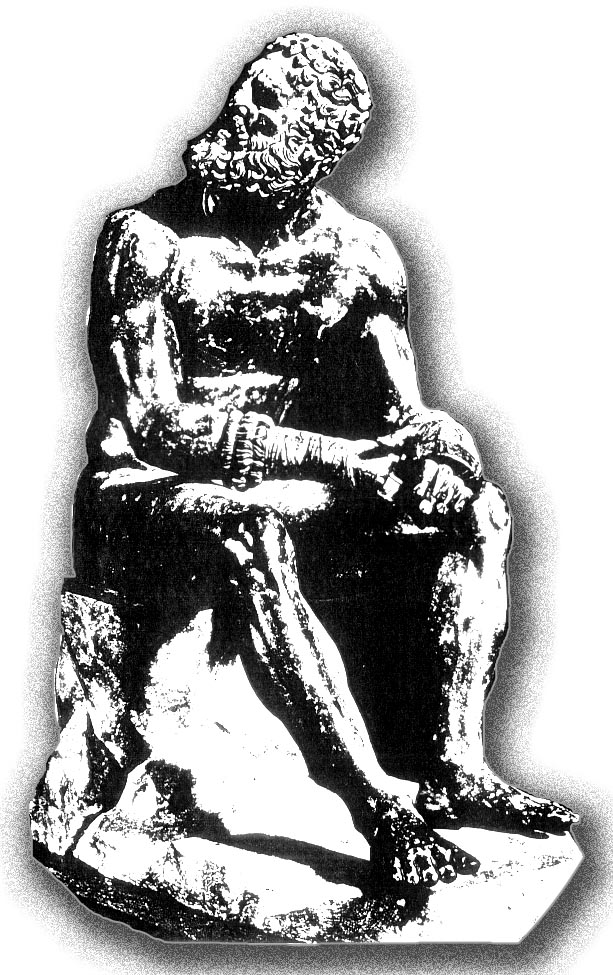 Unlike the later Games of Greece known as the CIRCUIT staged six times every five years in the four cities of Isthmia, Pythia, Nemea and Olympia for a further thousand years dated from 776BC – 393AD. These games competitors had to prove their Greek Citizenship, where as the Four Seasons Celtic Games known as Somhain (Winter), Imbolc (Spring), Beltane (Summer) and Lughnasa (Autumn) – these were all Funeral Games of thousands of years prior and were open to anybody and everybody all over Europe interested in developing their fighting skills by - pitting them against the skills of the Celts.
Unlike the later Games of Greece known as the CIRCUIT staged six times every five years in the four cities of Isthmia, Pythia, Nemea and Olympia for a further thousand years dated from 776BC – 393AD. These games competitors had to prove their Greek Citizenship, where as the Four Seasons Celtic Games known as Somhain (Winter), Imbolc (Spring), Beltane (Summer) and Lughnasa (Autumn) – these were all Funeral Games of thousands of years prior and were open to anybody and everybody all over Europe interested in developing their fighting skills by - pitting them against the skills of the Celts.
(With the above mentioned Somhain, the Winter Games specifically celebrating the birth, life, death and rebirth of their Sun God – This astrology based information will be covered in depth in future projects)
In today’s society the world knows much of the Pierre Coubertin Modern Olympic Games that are just over one hundred years of our modern era (since 1896), whilst we know little of the PAGAN ROMAN CAPITALINI GAMES, and their fight ‘to the death’ at the whim of the Emperor, performed by the GLADIATOR WARRIORS of the time. We know much less of the one thousand year history of the PRE-CHRISTIAN GREEK GAMES known as the CIRCUIT, with their historic major crowd draw attraction, the PANCRATION FIGHTERS (Meaning Game of all powers). What is a most disgusting ‘social crime’ against the culture and mythology of the Celts is that the world knows nothing of the Ancient Games of the Celts…and their famous Tara-Mileate Celtic FIONA warriors that had the courage to - ‘death-stare’ into the eyes and deep into the soul of the Bull.

Now the time has arrived for the modern world of today to hear of, and learn all about the TARA-MILEATE CELTIC *FIONA WARRIOR (The Celtic/Gaelic meaning of the Fiona is the one of the light, and of knowledge). This was the warrior that out skilled every one of his opponents that dared stand in his way, in any of the fighting forms and the many diversified athletics competitions for the honour to face death with the bull. He knew even if he were no match for the ferocious beast, his bravery would have him reborn. In this death-match the warrior Fiona wore a golden torque around his neck plus he/she wore a gold threaded body suit from his neck to his elbows and down to his knees; this was to symbolize his representation of the Sun God. For evidence of this description of these male and female Fiona warriors, from more than two thousand two hundred years ago, one needs to look no further than the well preserved:
‘CELTIC CAULDRON’ which is on display in the Copenhagen Museum, Denmark.
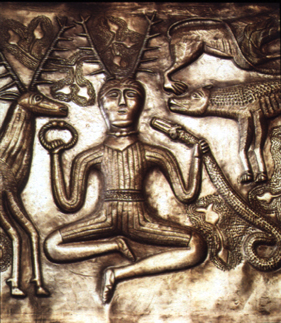 |
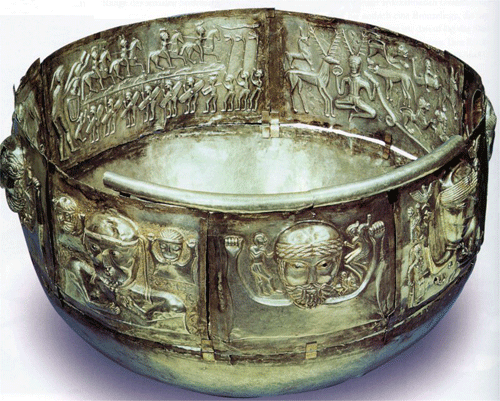 |
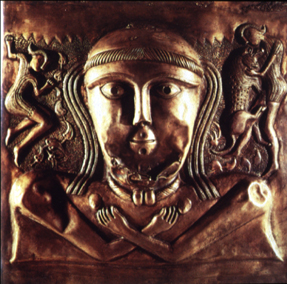 |
CERNUNNOS (shown left) holding a torque and serpents head (symbolising freedom and rebirth).
He was the "Lord of the Forrest - The Protector of All Animals".
His brilliantly gilded suit for his minimum protection was, during the midday sunshine, a blinding sight and his red and yellow ‘defensive drape’ he artistically swirled around his body, looked to be the rays of the sun itself (This ''defensive drape'' was developed after centuries of the Fiona facing the Tauras with only his shield and sword).
Today, this ancient warrior of the Sun God is very well known to the modern world as the ‘Matador’ just like the real life Conde de Vimioso from our play. Some would like to see the demise of his craft and this point of contention is covered dramatically during the play with one of those epic wars between Sarah ‘the Celt’ and Miai ‘the academic’. This is due to the fact that during this era of Severa and Vimioso it was legal and extremely popular to kill the bull in all of Portugal, but of course the powers to be, wanted it stopped… to us Celts, this is impossible. How after all of these thousands of years – can we have only two without the third? - i.e. birth and life without death? – or fado and fandango without faena! When one observes the ‘CELTIC CAULDRON’ you can not help but notice the dress code of the fiai and the matador have hardly changed at all in well over two thousand years!
And as for the opinions of human activists and animal rights campaigners, who are speaking defamatorily about this millenniums old mythology, their comments are absolutely ludicrous… the alternative for the Matadors ‘spectacular opponent’ in the Bullfighting arena would be, simply to be killed as a part of the regime of ‘mass animal death’ in slaughter houses and factories world wide for the ever increasing ‘daily consumption’ of the planets human population. In fact, it is simply a matter of the economics that if the breeding and training of this magnificent animal for the faena was to cease for any reason, it would be no time at all – before the magnificent beast itself, would no longer exist, being totally extinct.
We hope these brief Directors Notes have shed some light on the theme of a play like SEVERA! and the many more projects that our company CETIMANIA PROJECT Pty Ltd are currently preparing to launch in the very near future – In fact, these will commence as soon as SEVERA! The play proves that there is:
A large world wide audience just waiting to experience CELTIMANIA!
SEVERA! The play – An epic true story of the heart, a tragic love affair of the woman who woke fado from a very long sleep, and her man of the moment, Conde de Vimioso, the most amazing and the most famous matador of this era, together they will be responsible for - the beginning of this Celtic Awareness Revolution!
', 1, 14, 0, 47, '2009-08-31 04:08:12', 62, '', '2009-10-14 12:23:58', 62, 0, '0000-00-00 00:00:00', '2009-08-31 04:08:12', '0000-00-00 00:00:00', '', '', 'show_title=0\nlink_titles=\nshow_intro=\nshow_section=\nlink_section=\nshow_category=\nlink_category=\nshow_vote=\nshow_author=\nshow_create_date=\nshow_modify_date=\nshow_pdf_icon=\nshow_print_icon=\nshow_email_icon=\nlanguage=\nkeyref=\nreadmore=', 8, 0, 2, '', '', 1, 131, 'robots=\nauthor='); REPLACE INTO `jos_content` (`id`, `title`, `alias`, `title_alias`, `introtext`, `fulltext`, `state`, `sectionid`, `mask`, `catid`, `created`, `created_by`, `created_by_alias`, `modified`, `modified_by`, `checked_out`, `checked_out_time`, `publish_up`, `publish_down`, `images`, `urls`, `attribs`, `version`, `parentid`, `ordering`, `metakey`, `metadesc`, `access`, `hits`, `metadata`) VALUES (96, 'SEVERA!', 'severa', '', '
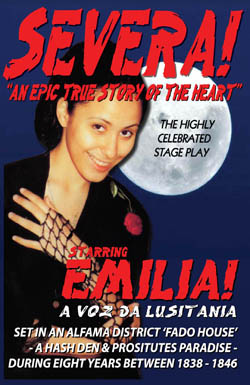 |
SEVERA!SYNOPSISOUR FADO HOUSETREATMENTSEVERASARAHTARAALIXPROFESSOR A. MIAI PhdPORTO & ORLANDOCONDE DE VIMIOSOINTERMISSION - ACT IIDIRECTORS CUT |
||
| TO WHOM IT MAY CONCERN:
We appreciate you taking the time to observe this exciting ‘New Project’ which is the life of SEVERA! A nineteenth century adventure experience of the true story of the rebirth of fado (Portuguese Blues). The story centres on the tragic love affair of one of Portugal’s favourite historical daughters, covering her life from eighteen years of age, to the final eight years of her life during 1838 – 1846.
Please allow me to introduce myself, my name is Robert V. Jones, I am one of two Directors of CELTIMANIA PROJECT Pty Ltd. Our Company currently based in Australia , is about to become a major driving force behind the current European resurgence of interest in Celtic culture. Our mission statement to this cause is the acronym of the word CELTS – “Connecting Europe’s Lost Tribal Societiesâ€. Mr Ivo Rato, the other Director is currently in Lisbon establishing our business interests His uncovering of the Celtic/Gaelic/language and the connection to mythology from the Iberian Peninsular, moving on to the United Kingdom many millennium ago, and how this eventually travelled down through the South Pacific Region - with the colonization of Australia in 1788. This became the recipe for the foundation of Mr Rato teaching this same Celt-Iberian history and culture to all students of my health, fitness and self defence organization for more than a decade, in Australia and both islands of New Zealand with recent expansion into several other countries. http://www.bobjonesmartialarts.com.au/ Added to all of this, the fact we have recently discovered and recorded an exciting young voice in downtown Lisbon, eighteen year old Emilia - singing with the passion of both Severa and Amalia. This discovery inspired me to draw from Mr Rato’s teachings of antiquity to create SEVERA! My creation of this play has the desire to tap into all the raw emotion of this gone by era. To be felt by everyone through the sensational abilities of this new 21st Century ‘Lusitanian fadista‘ whowe have chosen to be the “Voice of Lusitaniaâ€. We are confident Emilia has the raw talent, that will impact not only on the local Portuguese community, but also the Portuguese ‘Brave-hearts’ that since the revolution have travelled to all corners of the Globe, now numbering approximately 40,000,000 as world wide Portuguese migrants. Both the Portuguese community at home and migrants abroad added to Portuguese speaking Brazilians and you have 270,000,000 people with the sixth most spoken language on earth. This is a huge demographic of people for EMILIA! - SEVERA! to have an impact on. Enclosed is a SYNOPSIS AND TREATMENT. To move forward from this point so that myself and Mr Rato and a Portuguese playwright can develop and adapt the script and bring it to fruition, we are in need of the following support: A Portuguese Producer and Production Company, equity involvement from potential investment partners in this ‘Project as a Play’ and the necessary sponsorships. SEVERA! The Play will certainly attract involvement from a Government level as this will be the best attraction to Portuguese ‘culture and tourism’ that has come along for – the recent past and the foreseeable future! Thank you sincerely for your time thus far - please enjoy our following SYNOPSIS AND TREATMENT. To contact Mr Ivo Rato direct in Portugal on 9.2507.3532 or myself on mobile +61 419 586 559 or direct at Australasian head office phone, +61 3 9484 1760. Alternatively, please click here to fill out our contact form. CELTIMANIA PROJECT.com  SEVERA! – SYNOPSIS
The two elder sisters and the ‘mother’ share a passion, and this to protect at all costs the youngest member of this unusual ‘family’. They simply want for her, a better way of life than any of them had been born into, she is their very own princess that they feel – deserves the best! Severa, as a matter of historical fact which is fully documented, a larger than life real character of the mid 19th century, eventually discovered by her handsome debonair prince who enters Severa’s mundane existence and changes - ‘her life’ forever! (In this, the original pagan story, her prince is a real life Fiona i.e. Matador - the most famous of all, at this time in Portugal ) SEVERA! - The play is about love, sorrow, pain and transcendent power, through these emotions of fado the play continuously involves you in the sub-culture of the fadista’s, musicians, refugees, lovers, prostitutes and fiai’s (tough guys). Most importantly the play delves into and exposes ‘many unknown truths’ behind Lusitanian mythology and the sorrow of the ‘lost’ richness of Portuguese Celtic culture, definitely one of the richest of all - European Celtic cultures.
Since the beginning of time, in all corners of the earth folk music has held a tradition for vocalizing both the joy and the struggles of the proletariat, the underground and the down and out. In Portugal (In this case, the very under privileged Alfama district) a particular strain of folk music, mostly featuring the voice and the Guitarra Portuguesa (Which Severa herself - played competently), this magic of Severa with her voice and her guitar were responsible for interest on mass rising to the fore in the urban slums of the 1840s, and the 1850s and even after her tragic death and undoubtedly as a result, the popularity of fado exploded.
From the moment you enter the theatre and the usher has directed you to your seat, the music of SEVERA! is at the fore. Our CELTIMANIA PROJECT Musical Directors have painstakingly developed an internationally acclaimed ensemble of musicians, known as CELTIMANIC FADO. These fadista’s casually walk on stage while the audience is still being seated and begin to play, looking as much a part of the set as the hash pipe, crookedly hanging wall pictures and mismatched tables and chairs. Their playing is ridiculously good; even to the uninitiated ears, that much is obvious. Soon the cast appears and the music steps up a notch, cueing singing and dancing, that’s when the glasses of Sangrea and traditional Celtic delights are dished out to the audience. “What? Surely you didn’t think there’d be a Celtic play
|
|||
|
|
Severa: Sarah: Tara: Alix: Professor Antonio Miai - Phd: Porto: Orlando: Conde de Vimioso: Four musicians, members of Celtimanic fado: |
SEVERA

As a woman’s name is distinctly unique, after much research we are still to discover even ‘one’ other woman ever in Portugal (since 1846) to have the gift of this name, if there is ‘one’ that we missed with our endeavours, we feel you would agree the name would still be distinctly unique.
SEVERA/SEVERE is perfect as a two word description for the two parts of our play, in the opening Act Severa is beautiful with her human frailties and natural innocence. During the closing Act and due to circumstances out of her control, our darling Severa needs only one descriptive word befitting her newfound maturity – SEVERE!
Severa the daughter (played by the newest and brightest star on the fado horizon, very soon everyone will know the name, Emilia), is the youngest and most beautiful of the three singing waitresses. As the play opens her over protective psychotic mother has performed her maternal responsibilities reasonably well.
Even in these degrading conditions of squalor, Severa is a hard working eighteen year old, still with her virginity and an audacious innocence in tact (amazingly for this time and place in our history – more the norm by now was to have been married and had several children). She loves and respects her mother and dedicates herself to always keeping her mothers dilapidated establishment spotlessly clean and fresh – not an easy task, even at the best of times.
Severa has her private BLISS… deep in her personal psyche she carries an inner desire, a passion to sing fado that is different or at least to sing fado differently – she dreams about singing fado that will change the world to somehow be a better place. She waits patiently, and quietly, and on occasions, says a prayer for the time that her mother Sarah, might finally decide;
“Now is your time Severa, now!â€
SARAH
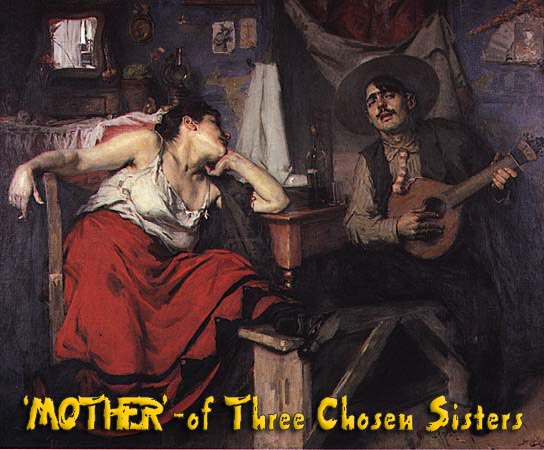
Sarah the ‘mother character’ is blessed with a complex understanding of ancient Lusitanian Celtic Culture (Written into her dialogue from the knowledge of Mr Ivo Rato’s extensive research of Portuguese Celtic anthropology) for the benefit of the theme of the play this knowledge of antiquity was passed onto her by her mother and her Grand-mother, both of whom were born and lived their entire ‘long lives’ high in the mountains of Braganca and Vinhais, Northern Portugal.
And she is passionate to impart this Celtic wisdom of ‘three mothers’ onto anyone who dares to listen, “For ‘every word’ of the Portuguese language that I have ever learned at school or in daily processors… I have ‘another word’ that means exactly the same – taught to me by my mother and Grandmother!†was just about Sarah’s favorite saying.
TARA

Tara, at just twenty years of age is the second eldest of our three ‘sisters’, she is a veteran of several abortions and has learnt her trade the hard way. A succession of dubious men throughout her short life, continuously prove to Tara she lacks self-defence skills. And she wears many scars both physically and psychologically, but she is never deterred from being a confidence abundant smart arsed wise cracker.
Tara has had a crack at just about everything and has come to the conclusion, nothing has ever paid as well as her prostitution and as she often jokingly states, “I don’t have a good time – I give itâ€. Tara loves her ‘mother’ and although she does not claim to understand her unusual ambitions, she respects her mothers’ wishes to protect the young one so that Severa may by some miracle – one day rise above it all - and she is a fierce alliance to this often demanding cause.
Tara is self assertive, always positive and totally unapologetic in all of her actions - she is a chronic chain smoker, mild alcoholic (in denial) and does enough cocaine on a ''high day'' and enough opium on a ''low day'' to last most junkies a week – Tara is a wild child, a stick of dynamite looking for someone to light the wick! She does find this someone, he does light her wick and sadly he is the cause of her – explosion!
(During a final scene in Act I Tara is sadly stabbed to death by one of her lovers in a train station subway, as she was trying to get away from it all on her way to new opportunity’s in London via Paris - It will take a very special actress to pull this character off and give this short lived life of the wonderful Tara, the true meaning and expression for the - absolute power and determination of commitment, that was within this woman’s autonomous spirit).
ALIX
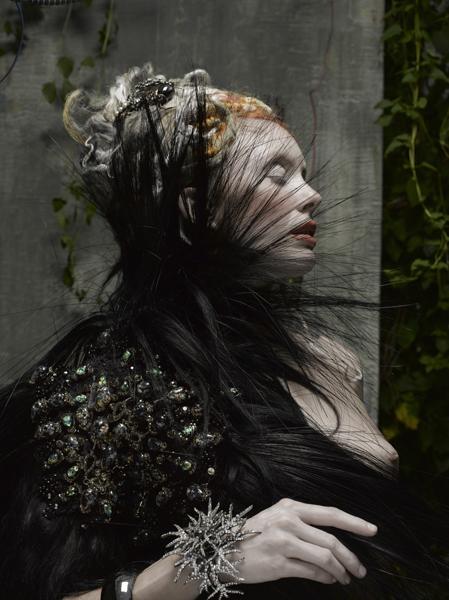
Alix, at twenty three is the eldest of the girls, with three young kids of her own (kids we hear a lot about but never get to see) all born to three different fathers and she is not even sure, who fathered who. A self confessed ‘gold digger’, she uses her prostitution to first and foremost, support her siblings, secondly to find that elusive customer who will be ‘mister right’ and take her and the kids away from all of this, and give her the - life-style she feels she is entitled to.
Alix, is a complex Jekyll and Hyde personality whose abuse of hashish makes it hard for even her to know, which of these two characters she is on any given day. She thinks she loves her ‘mother’ like she thinks she loves her kids! On the one hand, she believes she would protect her ‘little sister’ to the death – whilst on the other hand she thinks Severa’s virginity and her not doing drugs is; “Totally un-interesting, un-intellectual and totally un-professional, and why hasn’t she got a couple of kids already? Fuck, I mean she is fucking eighteen, so what’s her fucking problem?â€
PROFESSOR ANTONIO MIAI Phd
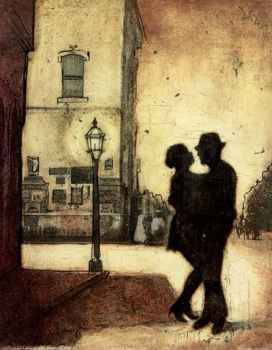 One of the four men and the only non fadista in our play is Dr Antonio Miai Phd, he is a mysteriously interesting sideline character that frequently fades in and out of the general perspectives of our storyline. He has only two interests, one is that he will play anyone in the fado house at backgammon, even though most times, in fact almost every time he plays he loses. What’s worse? He seems to enjoy losing. The good thing about this – it shows an interesting humorous quality to the personality of his character. Dr Miai’s only other desire, is to convince Sarah that she is totally wrong about the Celts and their connection to Lusitanian/Portuguese culture and that he may one day change her beliefs to be more in line with his own, and those of his piers.
One of the four men and the only non fadista in our play is Dr Antonio Miai Phd, he is a mysteriously interesting sideline character that frequently fades in and out of the general perspectives of our storyline. He has only two interests, one is that he will play anyone in the fado house at backgammon, even though most times, in fact almost every time he plays he loses. What’s worse? He seems to enjoy losing. The good thing about this – it shows an interesting humorous quality to the personality of his character. Dr Miai’s only other desire, is to convince Sarah that she is totally wrong about the Celts and their connection to Lusitanian/Portuguese culture and that he may one day change her beliefs to be more in line with his own, and those of his piers.
This entails Sarah and Miai having many heated discussions designed to really invoke/involve all members of the cast with their diversified opinions along with every member of the audience and their own decision making processes. Dr Antonio Miai Phd, now somewhere between his late thirties/early forties used to be a well respected University lecturer of history and philosophy.
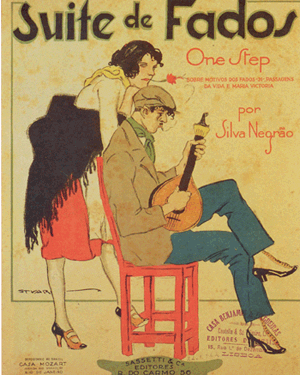 For reasons known best only to him at this point in time, he is currently a perpetually stoned Opium addict lying about on the side of the stage in an indiscreet corner of our fado house. Away from his backgammon challenges and his academia disputes with Sarah, Dr Miai is spending most of his time wrestling constantly with his personal sanity, and his hookah pipe.
For reasons known best only to him at this point in time, he is currently a perpetually stoned Opium addict lying about on the side of the stage in an indiscreet corner of our fado house. Away from his backgammon challenges and his academia disputes with Sarah, Dr Miai is spending most of his time wrestling constantly with his personal sanity, and his hookah pipe.
Although Dr Miai has had several financial encounters with both Sarah and Alix in the past, his recent favourite is Tara even though he spends most of his commercial encounters with her, simply indulging in intellectual stimulus, which of course Tara is more than capable and comfortable with. As the play progresses Dr Miai has become more and more acquainted with his hookah pipe and these supposed sexual encounters of his have become less frequent. Considering Dr Antonio Miai’s time is spent amongst friends in the fado house, is for the most part only involved in idle chatter and some light humour, he seems mostly unattached from them with his habitual extravagances.
(Then just towards the end of the first Act, a situation suddenly appears and results in a complete lack of ‘character strengths’ from our academic Dr Miai (We are led to believe at this time, may be the major reason for his addictions). This situation has him make some very bad decisions that cause absolute havoc to the main plot and sub plots, instantly affecting everyone.
The actor that plays Professor Antonio Miai Phd will have the chance to bring his acting skills right into the face of every audience member, of every performance. During the second Act there is an intense scene set in a prison cell where he is given the chance for absolute redemption for all of his past mistakes. He informs a certain cast member and us, the audience, the tragic reasons for his addictions. He confesses to us the story behind his self-guilt ridden conscience, born from the total belief he was responsible for the deaths of his wife and two young children in a house fire - making us more tolerable to his plight.
Then another devastating confession of a heinous crime to this cast member that we expect he may be murdered for, right there in the cell… each performance will have him under intense audience scrutiny. We should hope his acting is better than his backgammon!)
PORTO & ORLANDO - Two Fiai’s
Entering on and off the stage throughout all of this ‘fado house’ mayhem – are two extremists, both colourful characters who are known to us as Porto and Orlando, two fiai’s (i.e. The ancient Gaelic word for a couple of really bad guys), both of them are always impeccably dressed, one conservatively the other flamboyantly, one in his late fifties, the other in his late twenties. 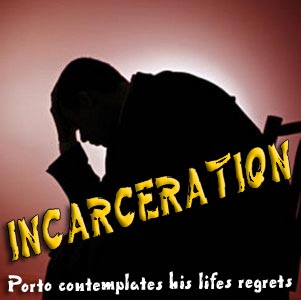
Porto, the eldest of the two fiai’s, although more than twenty years Sarah’s senior, is her live-in de facto, he is the absolute protector and moralistic ‘stepfather’ to the three singing waitresses, and in particular his very favourite, the youngest Severa. An extremely tough man whose code and philosophia, is one of personal integrity and mutual respect, he values these things above everything else. He also values these traits in other people to a high degree. Porto is what is referred to as an ‘old school’ Fiai whereby violence and large scale crime were within his capability due to his personal strength and high status in the slums - but no longer existing in his current ‘way of life’.
Orlando the younger is a hardened bully and extremely tough, using violence as a mode of his communication. Large scale crime, judicial and political corruption, regular police payouts, the prostitution industry, drug trafficking and even murder are all a regular part of his every day lifestyle. He could be described as a Fiai without as much respect for the old ways – sometimes defined as a “psuedo†or “phony†Fiai.
Orlando is father to one of Alix’s three kids (but he’s not sure which one), right at the moment he’s having a casual affair with Tara (what else could an affair be with Tara?). Although he has not entertained the sexual conquest of the boss of the house, he constantly taunts everyone in Sarah’s control by saying - Severa is next on his list.
(These two fiai’s are doomed from the start with the new against the old principles, rituals and ancient lore of these two Celtic Lusitanian warriors. Constant arguments, verbal challenges and several times to the brink of physical altercation, then just as the first act is closing – with no where else to go, both with deadly weapons drawn – one of these fiai totally unashamedly - belligerently murders the other!)
CONDE DE VIMIOSO
A real life character that in our play – is larger than life! He is a modern day Fiona of the nineteenth century, who today would be famously known as a matador. His character is proof of that age-old life-quote, “Power corrupts†and absolute power, “Absolutely corruptsâ€.
INTERMISSION - ACT II
Just as we thought we knew everyone and roughly where everything was going, it’s now time for the supposed hero to arrive. After many mentions during the play up to this point in time about this fiona super star often coming into the Alfama District, it was simply passed off as to be false rumours. “Bullshit, fucking bullshit, as long as a bull’s got two balls, he would not be seen dead in Alfama. He is the King of the Arena, the conqueror of the Faena. But if by some reason, he were to come into our area, surely he would visit the famous fado house of Sarah?†was Sarah’s and the general contention of the house. Then, on one particular day everyone was talking about this afternoons incredible Faena (i.e. ancient Celtic/Gaelic word for the ritual of the killing of the bull). “The biggest and most ferocious bull we have ever seen!†they were saying, “And by far, the bravest ever fiona†(i.e. ancient Celtic/Gaelic word for Matador).
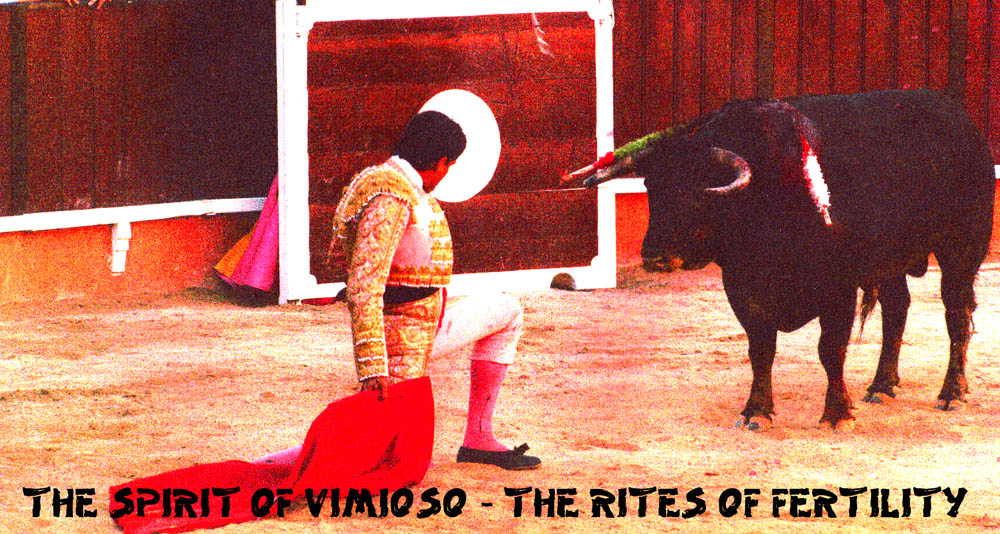
On this dark night with much of the sky being occupied by a magnificent ‘full moon’, distributing its silvery light of blissful intrigue, breathing life into the gathering party atmosphere of downtown Alfama, our fado house is full of much merriment with lots of drinking, constant laughing and joking mixed together with spasmodic sexual activity. All of this was about to be momentarily interrupted; with loud banging on the door… ‘Knock, knock, knock,’ this interruption snapped a cold eerie atmosphere throughout the house. Suddenly, as we are about to experience, our fado house as we have come to understand it, can from this moment in time never be the same again. “ENTER?†was the questioning raised response from Sarah, and enter he did - our one and only Matador extraordinaire, Conde de Vimioso. It is now time for this forceful character to make his presence felt, to enter the stage and our now intriguing - fado house with its merry band of misfits.
(During intermission, Severa brilliantly played by Emilia who has aged almost a decade, plus for the sake of the play she has lost her virginity. And this has all happened while you were having a drink during a thirty minute intermission. She has matured into a magnificent woman of mystery and intrigue, and the “tempestuous real life love affair†between these two characters - the prince and princess has already begun – ‘The dove has been set free and taken flight’.)
Tara is dead from the violent scene at the railway station. Porto is now serving the rest of his life in prison for first degree murder and the now deceased Orlando plays multiple roles as Duke, the policeman who put his arch enemy behind bars. And he then triples his role playing as Mario, the warder who makes Porto’s time in prison - hard time!
As the play matures, SEVERA! Is becoming a play concerning potential, it explores the potential in suffering regarding love and tolerance, politics and in music. As Porto says in Act I regarding a very ancient Celtic harp, “Even as it sits there, it holds the potential for joy, for love, for life itselfâ€. Even amongst all of this violence and incarceration, displacement and even death - the potential that fado music offers is what brings hope.
As ACT II - is coming to a climax, the denouement of the play at this point has many turns of events turning everything upside down with the most unusual paradoxes to all aspects of ACT I, taking all the known into new and different dimensions with a climax no one will expect. Conde de Vimioso, the infamous Knight without armour has made his impact; he is now the dominant character adding as much impact to the storyline as anyone thus far.
Why does Severa against all the advice of those who seemingly care - love him so passionately? What do we the audiences think of our Matador Vimioso? Do we love him? Or do we love to hate him? This is precisely the reason why SEVERA! will be enjoyed by everyone who bothers to take the unusual experience. We trust all who come will tell everyone they are in contact with and suggest they do the same. It would be much appreciated by ‘us’ if ‘you’ do not - disclose the actual ending, so that it is the same for them as it was for…
DIRECTORS CUT:
 From the beginning to the end of our Severa journey we the audience, are often reminded by her mother, Sarah – that for every Portuguese word she has ever learned, she knows another word of the same meaning.
From the beginning to the end of our Severa journey we the audience, are often reminded by her mother, Sarah – that for every Portuguese word she has ever learned, she knows another word of the same meaning.
She explains that these words were taught to her as a child by her mother and her Grandmother as she was growing up on the other side of the mountains. She had always done her best to teach this “language of the Lusitanian’s†and their “culture and mythology†to her daughter. Especially when she realized Severa, had the singing voice of an angel. Her mother knew that if Severa understood these unknown truths, she would not only sing fado from the heart – she would now sing fado from her soul!
During the recent two hundred years of modern fado there have been ‘three immortal singing sisters of choice’. All three were not only chosen because of their radiant beauty and magnificent voices, they were also chosen to be reminders and to be educators of these ancient ways of the Portuguese, not only at home but also to those who have travelled to all corners of the globe - It is this “Lusitanian fado†that unites the eternal spirit of all those who really listen.
SEVERA! - 1820
The first of these three immortal sisters was born in 1820; her name that you now know so well was of course Severa, she was the first chosen because it was her that woke fado from a long sleep. We know she sang fado from her heart and soul; this is evident from her overwhelming popularity almost two hundred years after her passing over.
AMALIA - 1920
The second sister by choice that also sang fado from her heart and soul, born one hundred years later in 1920, and of course everyone of you all know Amalia. She was chosen as sister number two because she understood that fado had to be taken around the world and introduced to every one of all nations, “When I listen to Amalia, I don’t understand her language, but she makes you love fado with a indescribable passion?†was the whole worlds response! And since her untimely passing over at almost eighty years of age, on October 6th 1999, she has become even more of an icon.
 EMILIA - 2020
EMILIA - 2020
Between now and the year 2020 the world of fado will have perfect vision of the youngest of the three chosen sisters, whom you already know well from her brilliant performance as Severa – this also makes you well aware she sings from her heart and her soul. Currently eighteen years of age Emilia, is “The Voice of Lusitaniaâ€. The exclusive lyrics to her songs are all penned by Mr Ivo Rato, Lusitanian historian and Celtic anthropologist, and together as a successful singer and songwriter team, they will “tell†the world…
“The truth so that it will be easily understood – then it shall be believedâ€.
The one major difference between Emilia and her two mentors, Severa in the nineteenth century and Amalia all through the twentieth century is that for these two hundred years they both sang Portuguese fado.
Now in the twenty first century Emilia sings only ‘her fado‘ and that is “LUSITANIAN FADO†this is why she is ‘THE VOICE’ - of the 21st Century.
There we have it, three immortal ‘sisters by choice’
Severa, Amalia and now, Emilia!
- << Prev
- Next
 SEVERA! - Is an ambitious undertaking: a musical play about the Portuguese Blues (
SEVERA! - Is an ambitious undertaking: a musical play about the Portuguese Blues ( throughout Portugal . We met almost thirty five years ago in 1975 and have remained very good friends during all of this time. I know him to be a unique anthropologist, Lusitanian historian with his knowledge of Celtic mythology being absolutely second to none. After many years of extensive research in Australia at the State Library of Victoria, Mr
throughout Portugal . We met almost thirty five years ago in 1975 and have remained very good friends during all of this time. I know him to be a unique anthropologist, Lusitanian historian with his knowledge of Celtic mythology being absolutely second to none. After many years of extensive research in Australia at the State Library of Victoria, Mr 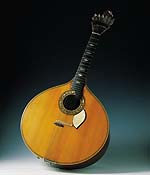 SEVERA!- The original Pagan version of Walt Disney’s epic love story of ‘Cinderella’, complete with the two horrible step sisters (three beautiful young prostitute
SEVERA!- The original Pagan version of Walt Disney’s epic love story of ‘Cinderella’, complete with the two horrible step sisters (three beautiful young prostitute 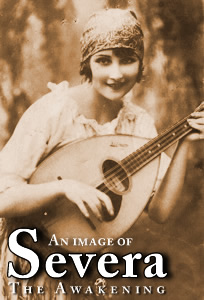 SEVERA! – The true dramatic story of Maria Severa
SEVERA! – The true dramatic story of Maria Severa 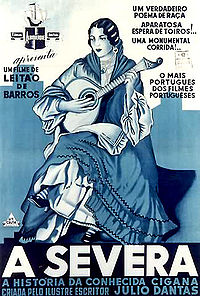 This word ‘fado‘ (ancient Celtic/Gaelic word basically meaning ‘long ago’) is sung by men and women known as ‘Lusitanian
This word ‘fado‘ (ancient Celtic/Gaelic word basically meaning ‘long ago’) is sung by men and women known as ‘Lusitanian 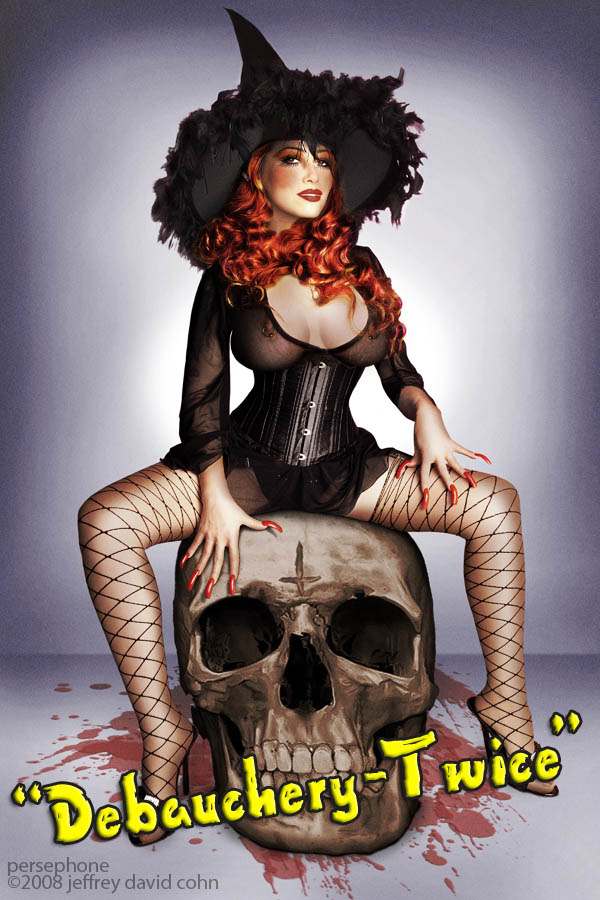 Our ‘
Our ‘